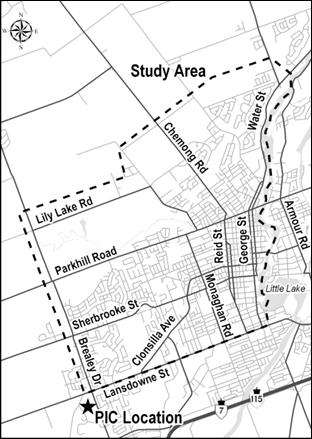The Friends of Jackson Park and the Friends of Peterborough Trails have compiled a list of the Top 10 Reasons Not to Build a Road on the Parkway Greenspace. Here they are...
1. The Parkway is not a solution to our traffic problems
The proposed Parkway fixes perhaps one-tenth of our traffic problems in the north end of the City. It links one fifth of the City’s planned north end residential areas to only one of the two main employment areas in the City. The City proposed the original "Parkway" route to bypass the city limits as they were in 1947. Other options better connect the places where we live to the places we work.
2. The Parkway Greenspace is one of Peterborough’s most precious assets
The Parkway Greenspace corridor is the largest and most significant natural habitat and open space in the north end of Peterborough, and one of the largest areas of green space in the City. It is a key part of the City trails network. The Parkway route also serves as an important wildlife corridor, along which wildlife can traverse a large swath of the city. It allows citizens, and most importantly our children, to observe wildlife and connect with nature.
3. The Parkway is not the best investment of our hard earned tax dollars
The projected cost of the Parkway is around 40 million dollars. This does not include costs to deal with noise, flooding and other infrastructure. Realistically, the price could be easily around $50-‐60 million. Do you want your taxes increased to pay for a road that doesn’t meet Peterborough’s needs; a road a majority of us don’t want, all for a time saving of one to three minutes? We have other critical spending priorities, including fixing the many poorly maintained roads we already have.
4. When given the opportunity to actually choose, the people of Peterborough said “No Parkway”
The Parkway has been a contentious issue in Peterborough for many decades. It was turned down by 55% of voters in a referendum in November 2003. Following that vote, City Council ordered the Chief Administrative Officer to have the Parkway removed from the Official Plan. This did not occur. Why was the voice of the people not respected and the why was the direction of Council not acted upon?
5. The Parkway Greenspace promotes a healthier population
Greenspace encourages people to get outside, to walk instead of drive, to interact with each other and connect with the natural world around them. Greenspaces are proven to support a better sense of community and improved mental health. The greenspace provides a place for city children to explore and play, for free, no matter what their financial means. We have an obesity epidemic costing us billions of dollars and untold health problems. Do we need to make the situation worse?
6. The Parkway Greenspace supports our children and our schools
There are five schools along the Parkway corridor. The Parkway will run directly alongside two primary schools. Putting a major arterial road directly next to or near these schools increases risks to students. Also, a main arterial road will eliminate safe opportunities for students to learn about science and nature, conduct their own research and experience outdoor education in a natural setting.
7. Previous consultants said we don’t have a problem, now or in the future
In their report to City Council on April 18th, 2011, consultants Morrison-‐Hershfield reported that even with no road improvements beyond those presently committed, the best performance models for 2031 show no significant congestion except around river crossings. This congestion is not addressed in any of the proposals related to the Parkway.
8. We are not growing as fast as projected so do we really need a new road?
Growth projections prior to the 2012 Comprehensive Transportation Plan turned out to be optimistic, and current slow economic progress and an ageing demographic may impact the projections used in the 2012 Plan.
9. The Parkway Greenspace supports Provincial planning directives
A 2012 Ministry of Municipal Affairs and Housing Provincial Policy Statement on Land Use Planning requires all municipalities to have and protect natural heritage systems that include natural corridors and linkages such as Jackson Park and the Parkway Greenspace corridor. A decision to build a road through these natural corridors would be contrary to such provincial directions
10. Paving the Parkway Greenspace will certainly lead to a bridge through Jackson Park
You only have to look at the incremental history of the “Parkway by Stealth” campaign to see that this will happen (despite the promises it won’t). When the southern and northern parts of the Parkway are finished, do you think they will leave a big bend around Jackson Park between the two?
If you believe in permanently protecting the Parkway Greenspace and Jackson Park, please let your councillor know. Alternative 2 (Fairbairn/3rd Line) is a far more effective route than the Parkway for connecting the places people live and where they work and shop, now and in the future. The Fairbairn/3rd Line route will not see the destruction of our precious greenspaces and makes even more sense given the many fewer residences affected and the proposed Lily Lake housing development.
Join us at the next Parkway EA meeting Thursday, June 27th from 4:00 pm -‐ 9:00 pm at the Peterborough Wellness Centre. This is the last time you will be able to ask questions about the route before the final proposal is presented to City Council in September!
---------------------------
[Contributed by PtboCanada's Evan Holt]
Tip us at tips@ptbocanada.com. Follow us on Twitter @Ptbo_Canada or Like us on Facebook.



















